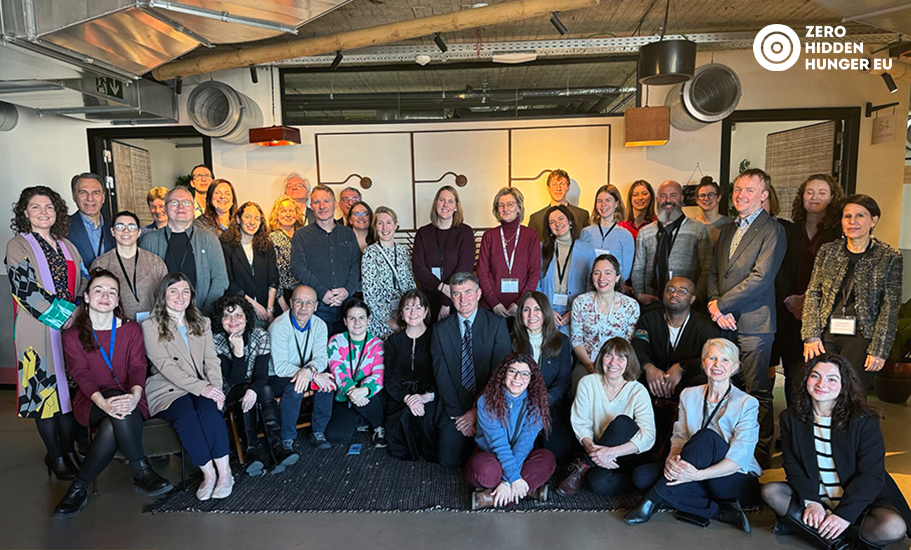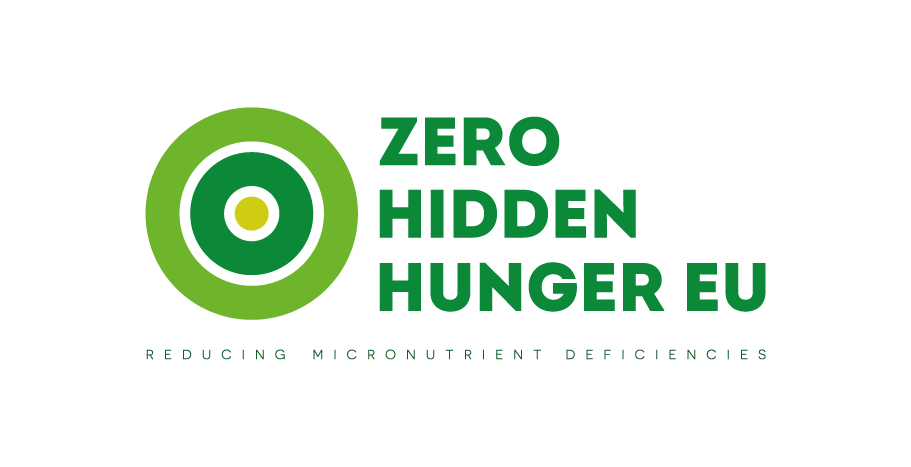Zero Hidden Hunger EU: Tackling micronutrient malnutrition and hidden hunger to improve health in the EU

Micronutrient deficiency is a form of malnutrition that occurs due to low intake and/or poor absorption of minerals and vitamins and can negatively affect human health and development. Children, adolescents, women of reproductive age (including during pregnancy) and older adults, as well as immigrant and ethnic minority groups and those affected by social inequality or poverty, are particularly at risk of micronutrient deficiencies. This represents around 70% of European citizens.
While addressing this public health problem is a priority, better data are needed on the prevalence and causes of micronutrient deficiencies across different regions and population sub-groups in the EU. These data would allow us to predict and identify those most at risk, and centre them in discussions about how to implement measures to support individuals in meeting dietary requirements for micronutrients of the highest public health concern.
In response to this pressing issue, the Zero Hidden Hunger EU project aims to generate comprehensive data on the prevalence of micronutrient deficiencies across the EU population and identify root causes.
Zero Hidden Hunger EU will:
- provide estimates of the true prevalence of micronutrient deficiencies, based on priority biomarker and micronutrient intake data in European populations, and their associated health costs, focusing on high-risk population subgroups
- produce and disseminate the best possible evidence to develop context-specific, tailored food-focused solutions to ensure an adequate supply of vitamins and minerals from diets from sustainable sources
Starting with existing high-quality data and biobanks from diverse and representative population sub-groups across Europe, and supplementing these resources with targeted studies in under-represented groups, Zero Hidden Hunger EU aims to deliver credible evidence that will empower policymakers and food system actors to devise effective food-focused strategies, eradicating micronutrient deficiencies from Europe.
The Zero Hidden Hunger EU consortium brings together expertise from 19 organisations, including public and private sector healthcare professionals, top-tier universities and research institutes, as well as social entities such as NGOs and regional governments, to develop effective knowledge and evidence-based solutions to micronutrient deficiencies.
Partners:
- Project coordinator: University College Cork - National University of Ireland, Cork (UCC) - Ireland
- UCC Academy Designated Activity Company (UCCAC) - Ireland
- Wageningen University (WU) - Netherlands
- Danmarks Tekniske Universitet (DTU) - Denmark
- Syddansk Universitet (SDU) - Denmark
- European Food Information Resource (EUROFIR) - Belgium
- Harokopio University (HUA) - Greece
- International Agency for Research on Cancer (IARC) - France
- Finnish Institute for Health and Welfare (THL) - Finland
- Max Rubner Institute (MRI) - Germany
- Consorcio Centro de Investigacion Biomedica en Red M.P. (CIBER) - Spain
- Institute for Medical Research and Occupational Health (IMR) - Serbia
- European Food Information Council (EUFIC) - Belgium
- European Public Health Alliance (EPHA) - Belgium
- Crowdhelix Limited (CHX) - Ireland
Associated partners:
- Swiss Nutrition and Health Foundation (SNHf) - Switzerland
- REM Analytics SA - Switzerland
- University of Surrey - UK
- Quadram Institute Bioscience (QIB) - UK

EUFIC’s role in Zero Hidden Hunger EU is to maximise the project's outreach and impact by managing communication and dissemination activities. This will be accomplished by engaging the project's target groups (e.g., via events and social media) and disseminating project outcomes on a timely and audience-appropriate basis.
EUFIC will also apply qualitative and quantitative research methods to investigate social, economic, cultural, health, and environmental factors associated with micronutrient deficiencies in vulnerable population groups.
Moreover, EUFIC will develop the Zero Hidden Hunger EU visual identity and will produce a variety of communication materials, targeted at different audiences (e.g., brochures and leaflets, infographics, presentation templates, etc.). EUFIC will also create practice-based learning resources including digital modules for the project’s target groups.
Since the launch of the project in January 2024, EUFIC has:
- Developed a brand identity, project templates and communication material targeted at different audiences (e.g., first press release, leaflet, social media posts) to be used for communicating about the project and related activities to different audiences.
Zero Hidden Hunger EU project logo

The graphic symbol represents this explicitly targeted objective. The outer circle of the target evokes vitamins, the central circle, trace elements and the heart of the target, minerals. The circles evoke data collection and echo the typographic character «0».
- Developed the plan for communication, dissemination and engagement of the project with a detailed strategy for different target groups.
- Developed the Zero Hidden Hunger EU project website available here.
This project has received funding from the European Union's Horizon Europe research and innovation programme under grant agreement No 101137127.
Funded by the European Union. Views and opinions expressed are, however, those of the author(s) only and do not necessarily reflect those of the European Union or the European Research Executive Agency (REA). Neither the European Union nor the REA can be held responsible for them.
Project coordinating Organisation: University College Cork
Joint project coordinators:
- Kevin Cashman – K.cashman@ucc.ie
- Mairead Kiely – m.kiely@ucc.ie
Media & communications:
- Debora Serra, Collaborative Projects Senior Manager (debora.serra@eufic.org)
- Nina McGrath, Content Production – Area Lead (nina.mcgrath@eufic.org)
- Florentin Ndizeye, Collaborative Projects Junior Manager (florentin.ndizeye@eufic.org)
- Katerina Palascha, Consumer Research – Senior Manager (katerina.palascha@eufic.org)
Social media
- Twitter: #ZeroHiddenHunger / @SciFoodHealth
- BlueSky: #ZeroHiddenHunger / @SciFoodHealth
- LinkedIn: #ZeroHiddenHunger / @SciFoodHealth